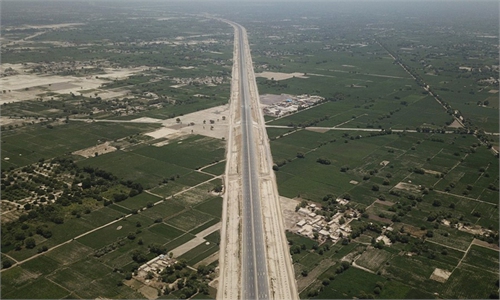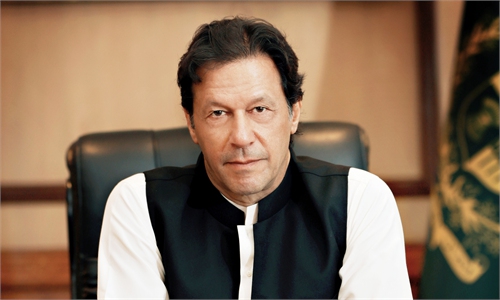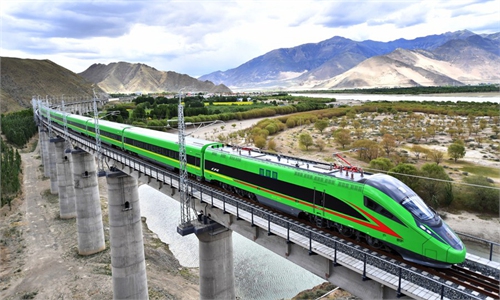IN-DEPTH / DIPLOMATIC CHANNEL
Pakistan-China relationship is a factor for stability in the region and beyond: Pakistani Ambassador
Editor's Note:
China and Pakistan are "iron brothers." Through the past seven decades, the two countries have built an All-Weather Strategic Cooperative Partnership with flourishing bilateral relations. On the occasion of the 100th anniversary of the founding of the Communist Party of China (CPC), Global Times reporters Xie Wenting and Bai Yunyi interviewed Pakistani Ambassador to China, Moin ul Haque (Haque), on the CPC, bilateral relations, vaccines as well as the pandemic that is still haunting the world.
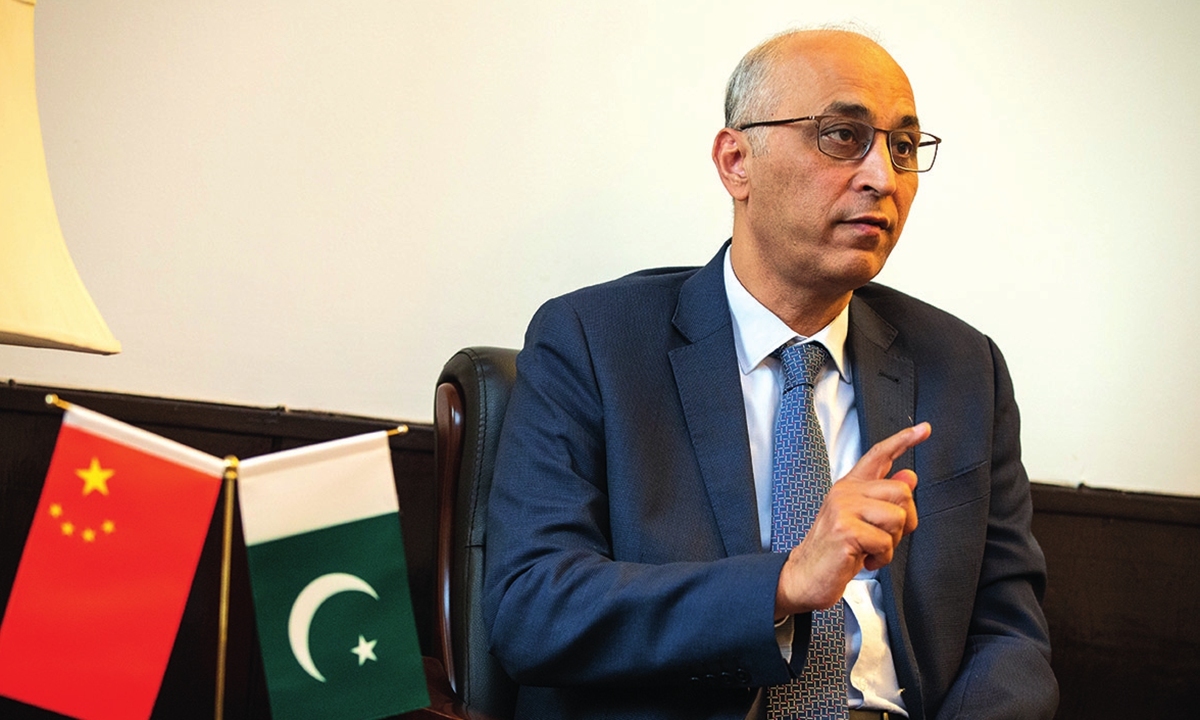
GT: This year marks the Communist Party of China (CPC) centenary. Based on your own observation, how do you evaluate the performance and development of the CPC over the past 100 years?
Haque: Let me first congratulate the people of China and the CPC for achieving the historic milestone of 100 years of the CPC. The Party has played a key role in China's development, starting from its liberation to poverty alleviation, which is a miracle. It is a historic feat by the CPC to lift almost 800 million people out of poverty.
CPC's policies are people-centric aimed at the wellbeing of the people of China. We are also grateful to the CPC for its strong support to China-Pakistan friendship.
GT: The CPC has been under vigorous attack from the West in recent years. What do you think are the reasons for those attacks? Some even said a growing CPC and China are a threat to the region. What do you think of this view?
Haque: When you have success, you will have attacks from your detractors. Don't worry about that. That's part of the game.
China's rise is peaceful. Its international relations are based on mutual respect and cooperation. China always supports multilateralism, international cooperation, and solidarity. We take pride in our relationship with China which is based on warm sentiments and shared values.
Pakistan-China relationship is a factor of stability in the region and beyond. Regional peace is important for development of our people, so that's why we promote friendly neighborly ties in our region.
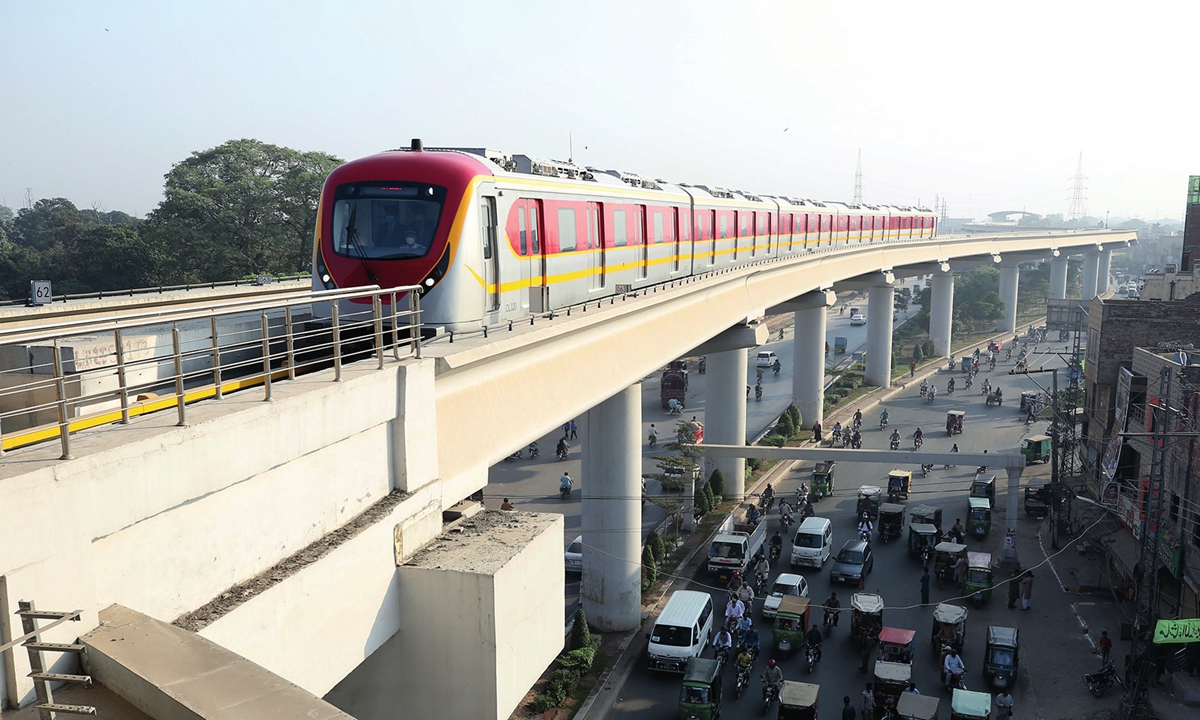
GT: This year marks the 70th anniversary of the establishment of diplomatic relations between China and Pakistan. How do you evaluate relations between the two countries over the past seven decades? How do you predict the future development of bilateral ties?
Haque: Pakistan-China relations are very unique and special. Over the past seven decades, the two countries have formed a close and friendly brotherhood. Today we are strategic partners and cooperate in almost every field. This year is a milestone in our relationship as we are celebrating 70 years of the establishment of diplomatic ties.
Our bilateral ties enjoy support at the highest level and have been nurtured over the years by successive generations of our leadership and people. This is the essence of our strong ties. We hope that in the next 70 years, we will take this relationship to even greater heights.
GT: Some Western media outlets wrongfully speculated that the CPEC is doomed amid increasing terror attacks. What's your response?
Haque: There are detractors of both Pakistan and China and they obviously don't like our friendship. There are countries which do not like the peaceful rise of China, so there will always be these critics and voices. But we are not worried about that because China-Pakistan friendship is rock solid.
China-Pakistan Economic Corridor constitutes an important element of our economic and investment cooperation. For us, it's a project which has transformed Pakistan's landscape. Few days back, Pakistan's Foreign Minister Mr. Makhdoom Shah Mahmood Qureshi had a meeting with the Ambassador Nong Rong in which he reaffirmed our commitment to CPEC and assured that Pakistan would make all efforts necessary for the timely completion of all projects.
GT: Some political analysts believe China and Pakistan's close relationship will intensify the conflict with or lead to a confrontation with India. What's your view?
Haque: No. I think our relationship is not directed against a third country. Pakistan is part of South Asia and we always strive to have good relationship with all countries of South Asia. Our neighborhood policy is based on the philosophy of co-existence with all our neighbors peacefully. This is also China's approach.
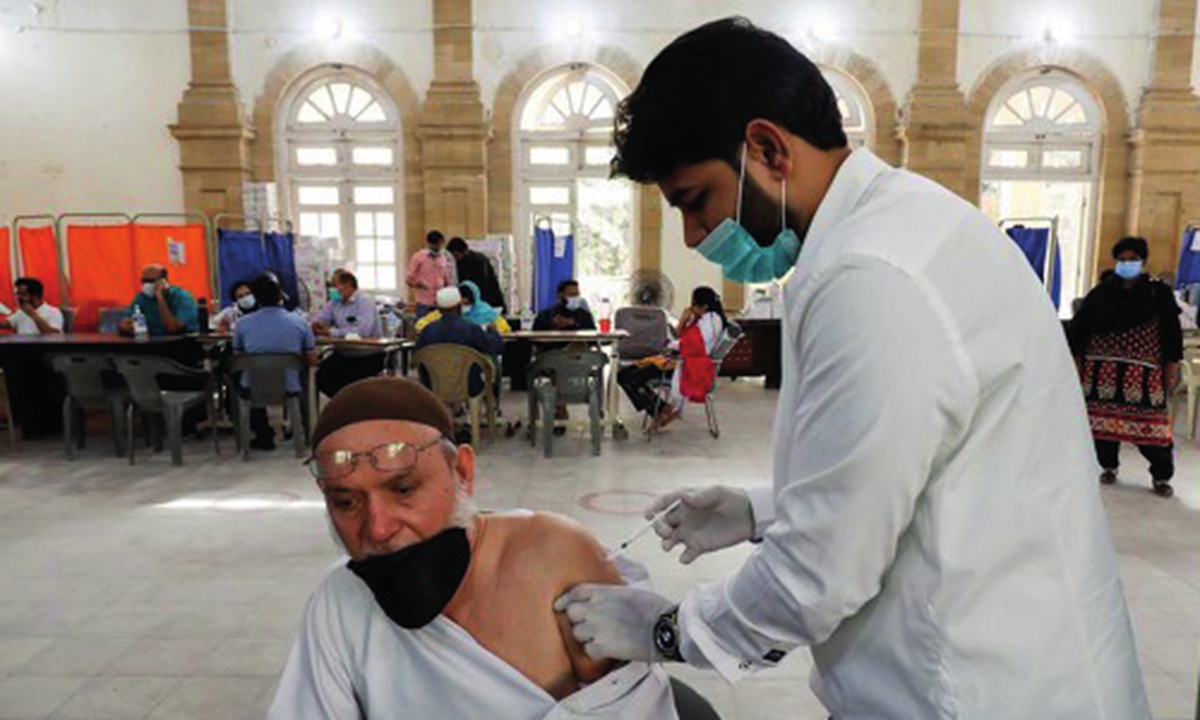
GT: The COVID-19 global pandemic is still engulfing the world. What efforts has Pakistan made to prevent cross-border transmission of the deadly virus? What are the challenges?
Haque: Pandemic has affected all the countries in the world. Pakistan was no exception. The government took very prudent and timely measures not only to protect lives and control the spread of the virus but also to ensure economic stability in Pakistan.
We have been able to control the virus and the situation is stable now. The next challenge is to vaccinate the majority of the population of our country.
The vaccination campaign has started in Pakistan for which we are grateful to China for its support. China helped Pakistan during our difficult times by providing essential relief goods. Now it has provided us with vaccines. The overwhelming majority of vaccines being used in Pakistan are Chinese made.
GT: Have you strengthened border control to prevent virus transmission from India?
Haque: We have strict border control to prevent the spread of the disease in Pakistan from neighboring countries. We are confident that we can control the spread of the virus.
GT: There's concern about the safety and efficiency of Chinese vaccines as expressed in Western media outlets. Does Pakistan have similar concerns?
Haque: Three Chinese COVID-19 vaccines have been registered in Pakistan for use. If there had been any concern, we would not have registered them. They are very safe and effective. Pakistani population is being vaccinated in large numbers by these vaccines. I have also been vaccinated by Chinese vaccines and suffered no side effects. So we are very satisfied with Chinese vaccines.
GT: Some Western politicians and media outlets accused China of allegedly adopting "vaccine diplomacy." What's your take on this accusation?
Haque: To address this unprecedented health crisis, there is a need to work together. We need international cooperation and it's not time for blame games or the politicization of a global pandemic. We call on all the countries to work together to address this challenge.
The policy of China is to make COVID-19 vaccines a public good. It provides vaccines to a large number of countries, especially the developing ones. In fact, Pakistan was the first country to receive vaccine donation from China. So we appreciate the role China is playing. The Chinese vaccines are saving lives around the world.
We are very happy to partner with CanSino [which has achieved local production in Pakistan]. They have conducted Phase-III trials in Pakistan and also set up their facility in Pakistan. As we move forward, we will upgrade our facility to produce domestic vaccines in Pakistan with the help of Chinese companies.
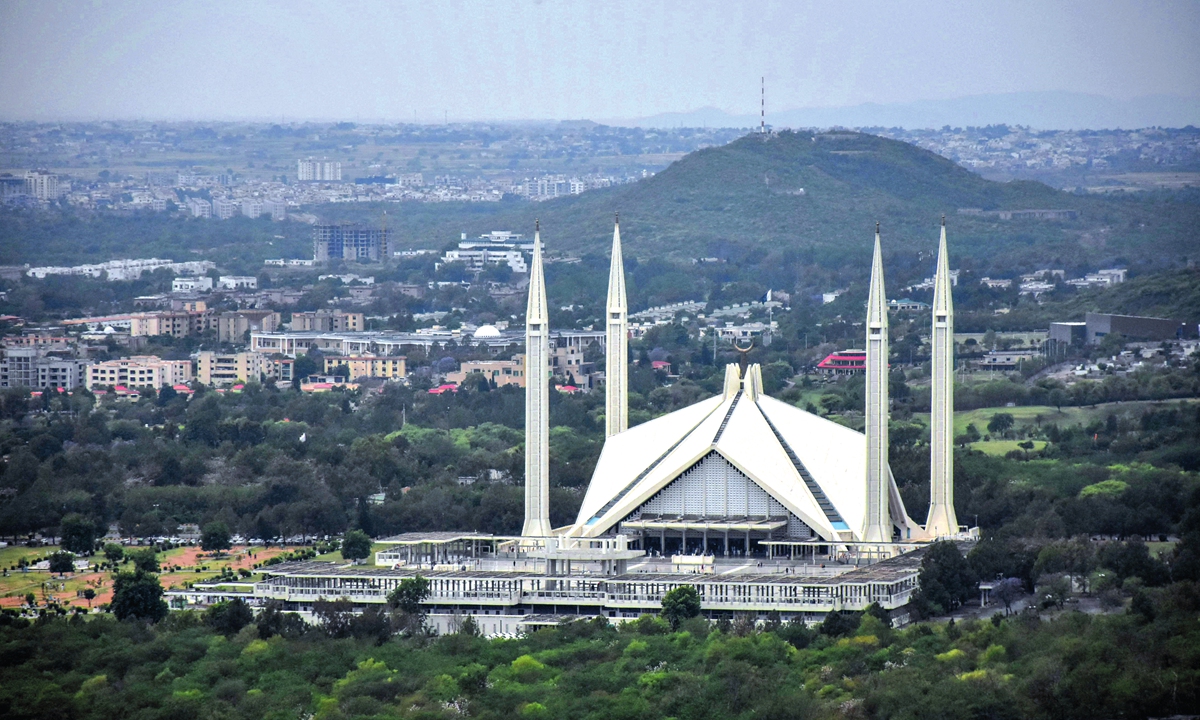
GT: After paying a visit to Xinjiang, what impressed you most during the trip? How do you evaluate China's policies in Xinjiang?
Haque: I had a very interesting visit to Xinjiang. We have very close ties with Xinjiang because it borders Pakistan. There have been historic cultural and trade linkages between our two regions. Xinjiang is a beautiful province and very diverse. I was impressed by the social harmony and preservation and promotion of the local intangible culture in Xinjiang. The level of development in the region was also impressive.
We visited many mosques. We could see the focus being paid by the Chinese government on religious harmony and freedom, as well as on the protection of the religious sites. That was quite remarkable.
GT: How do you evaluate the role China is playing in the Afghan peace process?
Haque: We recently had a trilateral meeting among the foreign ministers of China, Pakistan, and Afghanistan. It was a successful meeting and all three foreign ministers agreed on the importance of bringing peace and stability back to Afghanistan. We all want Afghanistan to stabilize as soon as possible so that people of Afghanistan can live a happy and peaceful life.
As the US forces withdraw from Afghanistan, there will be more responsibility on the government of Afghanistan and on the regional countries to cooperate to address the menace of terrorism.
China is already playing a very important role in trilateral cooperation. It did not only promote the peace process but also contributed to the development and reconstruction of Afghanistan. China is a friend of Afghanistan and working with the Afghan government to ensure that the peace process is successful. It is also providing essential assistance and aid to the government of Afghanistan.
China and Pakistan are "iron brothers." Through the past seven decades, the two countries have built an All-Weather Strategic Cooperative Partnership with flourishing bilateral relations. On the occasion of the 100th anniversary of the founding of the Communist Party of China (CPC), Global Times reporters Xie Wenting and Bai Yunyi interviewed Pakistani Ambassador to China, Moin ul Haque (Haque), on the CPC, bilateral relations, vaccines as well as the pandemic that is still haunting the world.

Moin ul Haque, Pakistani Ambassador to China Photo: Li Hao/GT
GT: This year marks the Communist Party of China (CPC) centenary. Based on your own observation, how do you evaluate the performance and development of the CPC over the past 100 years?
Haque: Let me first congratulate the people of China and the CPC for achieving the historic milestone of 100 years of the CPC. The Party has played a key role in China's development, starting from its liberation to poverty alleviation, which is a miracle. It is a historic feat by the CPC to lift almost 800 million people out of poverty.
CPC's policies are people-centric aimed at the wellbeing of the people of China. We are also grateful to the CPC for its strong support to China-Pakistan friendship.
GT: The CPC has been under vigorous attack from the West in recent years. What do you think are the reasons for those attacks? Some even said a growing CPC and China are a threat to the region. What do you think of this view?
Haque: When you have success, you will have attacks from your detractors. Don't worry about that. That's part of the game.
China's rise is peaceful. Its international relations are based on mutual respect and cooperation. China always supports multilateralism, international cooperation, and solidarity. We take pride in our relationship with China which is based on warm sentiments and shared values.
Pakistan-China relationship is a factor of stability in the region and beyond. Regional peace is important for development of our people, so that's why we promote friendly neighborly ties in our region.

A subway train enters the station in Lahore, Pakistan on October 26, 2020. This is the first subway line in Pakistan built with help from China. Photo: Xinhua
GT: This year marks the 70th anniversary of the establishment of diplomatic relations between China and Pakistan. How do you evaluate relations between the two countries over the past seven decades? How do you predict the future development of bilateral ties?
Haque: Pakistan-China relations are very unique and special. Over the past seven decades, the two countries have formed a close and friendly brotherhood. Today we are strategic partners and cooperate in almost every field. This year is a milestone in our relationship as we are celebrating 70 years of the establishment of diplomatic ties.
Our bilateral ties enjoy support at the highest level and have been nurtured over the years by successive generations of our leadership and people. This is the essence of our strong ties. We hope that in the next 70 years, we will take this relationship to even greater heights.
GT: Some Western media outlets wrongfully speculated that the CPEC is doomed amid increasing terror attacks. What's your response?
Haque: There are detractors of both Pakistan and China and they obviously don't like our friendship. There are countries which do not like the peaceful rise of China, so there will always be these critics and voices. But we are not worried about that because China-Pakistan friendship is rock solid.
China-Pakistan Economic Corridor constitutes an important element of our economic and investment cooperation. For us, it's a project which has transformed Pakistan's landscape. Few days back, Pakistan's Foreign Minister Mr. Makhdoom Shah Mahmood Qureshi had a meeting with the Ambassador Nong Rong in which he reaffirmed our commitment to CPEC and assured that Pakistan would make all efforts necessary for the timely completion of all projects.
GT: Some political analysts believe China and Pakistan's close relationship will intensify the conflict with or lead to a confrontation with India. What's your view?
Haque: No. I think our relationship is not directed against a third country. Pakistan is part of South Asia and we always strive to have good relationship with all countries of South Asia. Our neighborhood policy is based on the philosophy of co-existence with all our neighbors peacefully. This is also China's approach.

A resident receives a dose of the COVID-19 vaccine, at a vaccination center in Karachi, Pakistan on April 1. Photo: IC
GT: The COVID-19 global pandemic is still engulfing the world. What efforts has Pakistan made to prevent cross-border transmission of the deadly virus? What are the challenges?
Haque: Pandemic has affected all the countries in the world. Pakistan was no exception. The government took very prudent and timely measures not only to protect lives and control the spread of the virus but also to ensure economic stability in Pakistan.
We have been able to control the virus and the situation is stable now. The next challenge is to vaccinate the majority of the population of our country.
The vaccination campaign has started in Pakistan for which we are grateful to China for its support. China helped Pakistan during our difficult times by providing essential relief goods. Now it has provided us with vaccines. The overwhelming majority of vaccines being used in Pakistan are Chinese made.
GT: Have you strengthened border control to prevent virus transmission from India?
Haque: We have strict border control to prevent the spread of the disease in Pakistan from neighboring countries. We are confident that we can control the spread of the virus.
GT: There's concern about the safety and efficiency of Chinese vaccines as expressed in Western media outlets. Does Pakistan have similar concerns?
Haque: Three Chinese COVID-19 vaccines have been registered in Pakistan for use. If there had been any concern, we would not have registered them. They are very safe and effective. Pakistani population is being vaccinated in large numbers by these vaccines. I have also been vaccinated by Chinese vaccines and suffered no side effects. So we are very satisfied with Chinese vaccines.
GT: Some Western politicians and media outlets accused China of allegedly adopting "vaccine diplomacy." What's your take on this accusation?
Haque: To address this unprecedented health crisis, there is a need to work together. We need international cooperation and it's not time for blame games or the politicization of a global pandemic. We call on all the countries to work together to address this challenge.
The policy of China is to make COVID-19 vaccines a public good. It provides vaccines to a large number of countries, especially the developing ones. In fact, Pakistan was the first country to receive vaccine donation from China. So we appreciate the role China is playing. The Chinese vaccines are saving lives around the world.
We are very happy to partner with CanSino [which has achieved local production in Pakistan]. They have conducted Phase-III trials in Pakistan and also set up their facility in Pakistan. As we move forward, we will upgrade our facility to produce domestic vaccines in Pakistan with the help of Chinese companies.

Faisal Mosque in Islamabad, Pakistan Photo: Xinhua
GT: After paying a visit to Xinjiang, what impressed you most during the trip? How do you evaluate China's policies in Xinjiang?
Haque: I had a very interesting visit to Xinjiang. We have very close ties with Xinjiang because it borders Pakistan. There have been historic cultural and trade linkages between our two regions. Xinjiang is a beautiful province and very diverse. I was impressed by the social harmony and preservation and promotion of the local intangible culture in Xinjiang. The level of development in the region was also impressive.
We visited many mosques. We could see the focus being paid by the Chinese government on religious harmony and freedom, as well as on the protection of the religious sites. That was quite remarkable.
GT: How do you evaluate the role China is playing in the Afghan peace process?
Haque: We recently had a trilateral meeting among the foreign ministers of China, Pakistan, and Afghanistan. It was a successful meeting and all three foreign ministers agreed on the importance of bringing peace and stability back to Afghanistan. We all want Afghanistan to stabilize as soon as possible so that people of Afghanistan can live a happy and peaceful life.
As the US forces withdraw from Afghanistan, there will be more responsibility on the government of Afghanistan and on the regional countries to cooperate to address the menace of terrorism.
China is already playing a very important role in trilateral cooperation. It did not only promote the peace process but also contributed to the development and reconstruction of Afghanistan. China is a friend of Afghanistan and working with the Afghan government to ensure that the peace process is successful. It is also providing essential assistance and aid to the government of Afghanistan.
